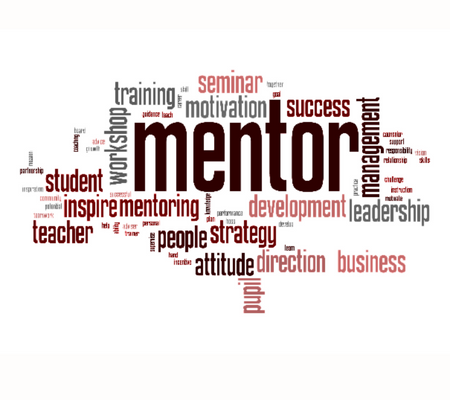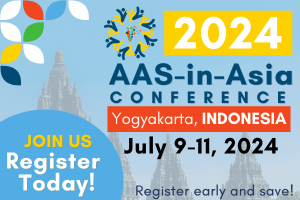Introducing the AAS 2023 Conference Mentors

We are pleased to invite graduate students and early career scholars attending the AAS 2023 Annual Conference in Boston to participate in our Conference Mentor Program.
The AAS Conference Mentor Program connects early career Asianists with advanced scholars, teachers, and professionals to both build their professional network and seek advice and informal guidance within a structured setting.
Mentors will lead an open-ended discussion with a group of no more than nine individuals on a variety of topics.
Mentorship sessions will take place at the Hynes Convention Center, as 60-minute meetings, between 9:30am and 5:00pm on Friday, March 17 and Saturday, March 18.
As spaces are limited, we ask that you sign up for no more than one (1) mentorship session March 13 update: participants are permitted to sign up for two (2) mentorship sessions.
If spaces remain unfilled or become available, you may also sign up for additional sessions on-site at AAS 2023 in Boston.
AAS 2023 Conference Mentors, Topics, and Schedule
Some mentors provided short explanations of their session topics—those appear in quotation marks below the mentor’s information.
Friday, March 17, 2023
9:30-10:30am
Getting your article or book published
- Jonathan Abel, Associate Professor of Comparative Literature and Japanese, Pennsylvania State University
Engaged learning with undergraduates
- Xiaolin Duan, Associate Professor of History, North Carolina State University
Engaging in career service and how to use that to your benefit
- Anand Yang, Professor of History, University of Washington
Working in and beyond academia/Asian Studies
- Ran Zwigenberg, Associate Professor of Asian Studies and Jewish Studies, Pennsylvania State University
“I have a bit of an unusual background, as I came from outside of academia and Asian Studies (originally started in German/Jewish studies) and transitioned into my current career at a later stage in life. I still keep one leg outside of academia and Asian studies, working with museums and the like, and, thus, I believe I can give feedback to students on a slightly more expansive range of topics than it is usual with those of us who went through the system.”
11:00am-12:00pm
Navigating the US job market and employment as an immigrant
- Hsiao-wen Cheng, Associate Professor of East Asian Religions, University of Pennsylvania
“I was on the job market for 4-5 years and held two postdoc/temporary research positions before starting to work at Penn. I went through the tenure process at Penn and have served in a search committee a few times. I also went through H1B status, green card, and now citizenship. I’ve witnessed numerous cases of friends and colleagues who had encountered visa issues, which severely impacted their career and livelihood. I hope related knowledge and experience can be publicly discussed and transmitted.”
CV Lines: Turning “papers” into publications
- Rachael Hutchinson, Professor of Japanese Studies, University of Delaware
“I have examined a lot of PhD theses and also serve as manuscript reader for a wide range of presses, so I can see the differences between “thesis” and “book” easily now. It took me a long time to publish my own thesis as a book, so in order to apply for jobs I determinedly set about creating “CV lines” that I could later develop into larger projects. This has been a very deliberate process for me, bringing in material from class lectures, invited lectures, conference papers, etc. to build longer book projects from the ground up. I have also used conferences to meet people with similar interests, and signaled my availability to editors of books and journal special issues, so they know I am interested and ready to contribute. Conversely, when editing books I seek out interesting papers at conferences to invite contributors for these projects. Now I am serving on many search committees myself, I can see how impressive CVs contain not just large projects but a clear trajectory, showing someone who can turn small projects into larger ones. If conference attendees have questions about this process I would like to help answer them.”
Preparing for tenure-track careers
- Suma Ikeuchi, Associate Professor of East Asian Languages & Cultural Studies, UC Santa Barbara
Navigating the US job market and employment as an immigrant
- Liang Luo, Professor of Chinese Studies, University of Kentucky
Building an Asia-focused public humanities project or program
- Roberta Martin, Director of the Asia for Educators program (AFE), Columbia University
Teaching and mentoring of undergraduates
- Susie Woo, Associate Professor of American Studies, California State University, Fullerton
“I’m currently in my 9th year at California State University, Fullerton in the Department of American Studies. I have worked with thousands of undergraduates and work with around 4 graduate students per year. I love mentoring students and recently developed a community partnership with a local elementary school. I remain deeply committed to diversity and inclusion efforts within and beyond my department.”
2:00-3:00pm
Teaching and mentoring of undergraduates
- Alisa Freedman, Professor of Japanese Literature, Cultural Studies, and Gender, University of Oregon
Getting your article or book published
- Sabine Frühstück, Koichi Takashima Chair in Japanese Cultural Studies, UC Santa Barbara; co-editor, Journal of Japanese Studies and chief editor of a book series with University of California Press
Teaching in K-12 schools or Community Colleges
- Erica Vogel, Professor of Anthropology, Saddleback College
“I am a professor of Anthropology at Saddleback College, which is a community college in California. I would be happy to talk about transitioning from the PhD to a career in the community colleges. I have also continued to publish while in this position so could speak to that in terms of how to publish or how to apply for grants.”
3:00-4:00pm
Organizing conferences and events, participating in conferences and events
- Maura Dykstra, Assistant Professor of History, California Institute of Technology
“In spite of being in a single-authored manuscript discipline, I have established a reputation through involvement in various conferences, institutes, and initiatives. I take a patently social perspective on the academic endeavor that may help inform the members of our profession who are not quite as naturally outgoing. My perspective on academia-as-social-sphere is informed both by my interest in political economy broadly and from a position of critique. I insist that it’s not “natural” or “fair” to expect these things from scholars and, therefore, that those of us being asked to organize, to teach, to profess, and to share our research broadly must take a deliberate approach to building a public profile within the field.”
Careers in teaching universities
- Sarah Grant, Associate Professor of Anthropology, California State University, Fullerton
“My primary interest is mentoring traditionally underrepresented students and scholars to navigate spaces not designed for us. In particular, I am an advocate for finding value in a variety of institutions, ranks, and types of teaching positions and career pathways that are often overlooked in academic spaces and conferences.”
Preparing seminar paper and theses for publication
- Robert Shepherd, Visiting Associate Professor of International Affairs and Anthropology, George Washington University; Editor, Critical Asian Studies
4:00-5:00pm
Writing a research grant proposal
- James Benn, Professor of Religious Studies, McMaster University
Advancing transnational and translingual research
- William Hedberg, Associate Professor of Japanese, Arizona State University
“As someone who works in two languages (Japanese and Chinese) and studies the formation of national literary traditions, I am interested in the challenges of advancing transnational and translingual research within the context of departments and institutions still very much rooted in traditional nation-state paradigms.”
Navigating the Japanese job market/teaching in Japan
- Lindsay Nelson, Associate Professor of Political Science and Economics, Meiji University
Writing for non-academic audiences
- Amy Stanley, Wayne V. Jones II Research Professor of History, Northwestern University
Saturday, March 18, 2023
9:30-10:30am
Careers in Asian studies professional development programming for K-12 educators
- Lynn Parisi, Director of the Program for Teaching East Asia, University of Colorado Boulder
“My general interest/commitment is to address the challenge of attracting Asianists to careers in professional development, inservice education, curriculum development and Asian studies advocacy for the K-12 level.”
Getting your book published
- Brooke Schedneck, Assistant Professor of Religious Studies, Rhodes College
Applying to and Thriving in a Teaching-Focused Institution of Higher Education
- Paige Johnson Tan, Professor of Political Science, Radford University
“I would like to talk with younger colleagues about how to apply to teaching-focused institutions, interview, prepare and how to thrive there if that’s where their career takes them. Many younger scholars are prepared by R1 faculty to be R1 faculty, but many will in fact go to institutions like my university, Radford, where teaching and service are just as important as your research.”
Women in the academy, service and leadership
- Gennifer Weisenfeld, Professor of Art, Art History and Visual Studies, Duke University
11:00am-12:00pm
Navigating the European job market
- Dayna Barnes, Associate Professor of International Security Affairs, National Defense University
Thriving as a writer
- Nicole Barnes, Associate Professor of History, Duke University
“This session will cover fundamentals of securing time and attention for writing in the midst of a work schedule full of immediate accountability events (teaching and service). Successful academics must develop the habit of protecting the long-haul accountability event that is our writing. I will discuss specific tactics and techniques backed by research on faculty writing (many of which have worked well for me), the importance of knowing one’s own writing rhythms and needs, the role of community, helpful books about writing, etc.”
Library/non-professorial careers in academia
- Rebecca Corbett, Director, Special Projects & Japanese Studies Librarian, University of Southern California
SESSION CANCELLED Teaching in an interdisciplinary program
Benjamin Young, Assistant Professor of Government and Public Affairs, Virginia Commonwealth University
2:00-3:00pm
Thriving in contingent faculty positions
- Jessamyn Abel, Associate Professor of Asian Studies, Pennsylvania State University
“Having spent nearly a decade in contingent positions, then transitioned to a tenure-track, and finally received tenure a few years ago, I can speak about both managing contingent positions and preparing for a tenure-track position.”
Teaching Asian Studies in K-12 schools or community/technical colleges
- Lynn Kalinauskas, NCTA Senior Staff Associate at the Program for Teaching East Asia, University of Colorado Boulder
3:00-4:00pm
SESSION CANCELLED Teaching and Mentoring of undergraduates – Addressing Incivility in the Classroom
Lex Jing Lu, Assistant Professor of History, Clark University
Preparing seminar paper and theses for publication
- Antje Richter, Associate Professor of Chinese, University of Colorado Boulder; Editor for East Asia, Journal of the American Oriental Society
Navigating the dissertation process
- Ann Waltner, Professor of History, University of Minnesota Twin Cities
4:00-5:00pm
Navigating US job market as an immigrant
- Qin Gao, Professor of Social Policy and Social Work, Columbia University
“I have experience in earning tenure in three different U.S. universities and later as a mentor and appointment/tenure committee member. I would love to share my perspectives and lessons learned from these different experiences, particularly for scholars who conduct interdisciplinary research and for women immigrant scholars.”
Navigating academia as junior faculty
- Denise Ho (Associate Professor of History, Yale University), and
- Shellen Wu (L.H. Gipson Chair in Transnational History, Lehigh University)
“Possible topics may include: starting your first job, balancing teaching and research, adjusting to new campus culture, etc. We would also be happy to address being a minority and or being a woman as a junior faculty member. We are both historians of China, and founder members of the Gender Equality in Asian Studies group. “
Using hands-on classroom activities, special collections, and material artifacts in teaching East Asian history
- Joseph Ho, Assistant Professor of History, Albion College
Preparing seminar paper and theses for publication
- Morgan Pitelka, Bernard L. Herman Distinguished Professor of History, University of North Carolina at Chapel Hill; co-editor, Journal of Japanese Studies
From Working inside Academe to Working alongside Academe: Perspectives from a Noncitizen
- Yanqiu Zheng, Program Officer for the China and the Global South Project, Social Science Research Council
Questions? Contact AAS Digital Media Manager Maura Elizabeth Cunningham, mcunningham@asianstudies.org


